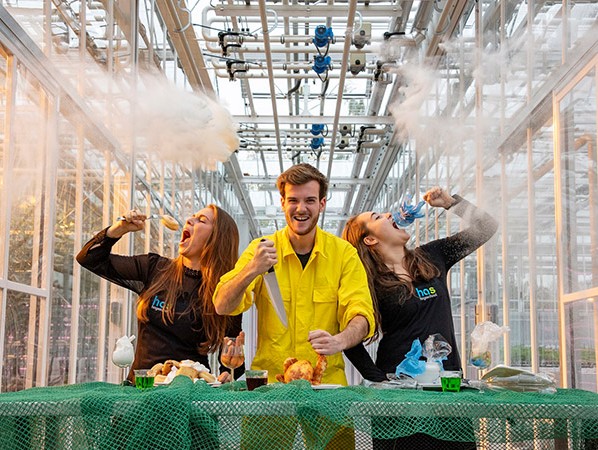
More than 200 up-and-coming food professionals presented their innovative projects during the HAS Food Experience on 5th February 2019 under the theme 'Today's Food Challenges'. An inspiring exhibition, full of innovations and vibrant young talent.
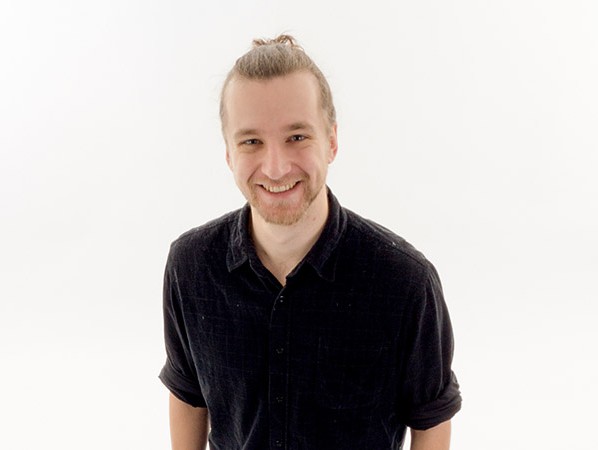
Image: Mick Assies
"From my experience in the Dutch coffee industry and after research into the Kenyan coffee value chain, I wanted to carry out a project through which I could promote awareness in the coffee value chain, this time in the Netherlands.
Many Dutch consumers think that things are going well with the coffee chain. Actually this is not the case. In Kenya many farmers cut down coffee bushes to grow maize, because this yields much more than coffee. The value chain is badly structured, particularly the West earns a lot of money. The farmers' costs for producing coffee are rising, but the West does not want to pay for it. As a result, farmers can no longer buy manure and do not pay their staff. If we in the West do not think about what and how we consume, we lose the products we love.
We live in a 'single-use' society. Cardboard and plastic packaging are meant to be used only once. We hardly think about this. 'Puck it' is still a single-use product, but in contrast to conventional to-go cups it is completely compostable. Puck-it is made from coffee dregs and a binder. The biggest challenge was finding the right ingredients. They had to be naturally biodegradable, moist and temperature resistant. After much research and testing I found the right composition to make a cup from which coffee can be served.
The consumer who gets hold of this cup, will hopefully think more consciously about their consumption and recycling behaviour, give more attention to the product, instead of focusing on more, cheaper and faster consuming. I hope that we will pay more attention to quality rather than quantity.
This process has taught me that everything is possible if you believe in it yourself. Especially if you motivate and inspire people at an early stage. I'm not a fan of secrecy. If you want to create something, you have to be open about yourself and your ideas. Many people told me that my project was too ambitious and that I didn't have enough time to realise it. It feels very good that it has succeeded, and I that I managed to prove the naysayers wrong. Everything is possible if you just keep connecting with the right people.
The next step is to investigate what the composting time of the cup is. I also want to look at possibilities to produce the cups on a larger scale. I received a great response during the Food Experience. The first meetings have already been scheduled."
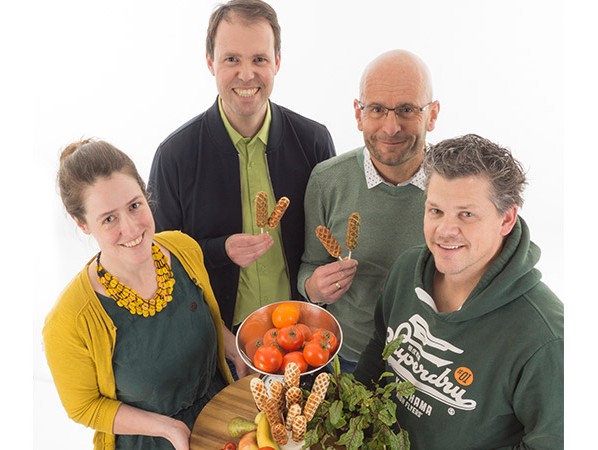
Image: (left to right) Jiska Maarsen, Jeroen van der Leeden, Niels Goudswaard en Jeroen Mulder
"We were challenged to develop a crispy crust for a company without a deep-frying process, and laid the foundation for Redondo - Non-fried & hybrid snack. It was one of our concept ideas for using bread. Bread also becomes crispy in the oven. Because we all already work in the industry, we were inclined to seize the most obvious solution, an adapted coating system.
But we were challenged to think bigger. That's how we arrived at a new concept: the vegetable bread snack. The ingredients are kept as simple as possible: fruit and vegetables, flour, water, salt and yeast.
What we came up against most was the time factor. Because we all work fulltime next to this study, it was difficult to find time to spend a whole day together in the test kitchen to be able to develop the product. That was, incidentally, a blessing in disguise. By combining our practical experience and skills with each other and adding to this the additional theoretical knowledge gained, we were able to work very efficiently. This allowed us to think of a number of variations. The combination of vegetables/fruit with bread dough is clearly a trend throughout the food industry. This offers endless flavoured options. The Toastick can certainly contribute to a healthy lifestyle.
The next step is to hold a focus group to determine how the product can be improved, and which aspects of the concept are appealing and which ones aren't.
What made this process especially unique for us was working with four experts. A nice, positive dynamic developed very quickly in our team. Especially sparring with experts from various fields is very productive, because everyone has a different view. During the Food Experience there was a lot of interest in the product. Especially caterers are interested, because the Toastick fits in with the offering of a healthy school canteen according to the guidelines of the Nutrition Centre."
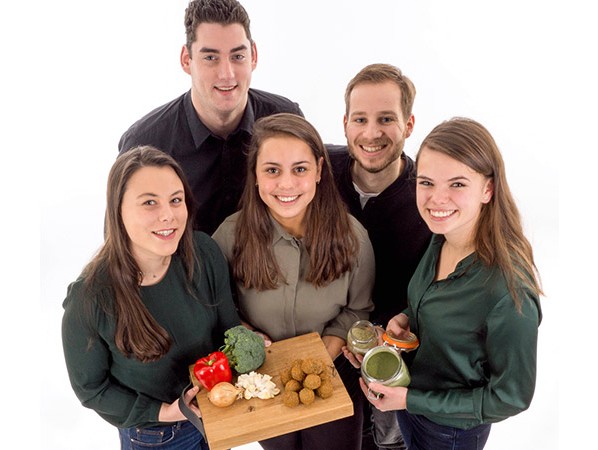
Image: (left to right) Karen Dirks, Kevin van Kuijk, Raisa Hupsel, Fokke Cornelissen en Susan Ardts. They won over the audience
"Saltwater algae have a high nutritional value. They are rich in proteins (especially essential amino acids) and thus they can be a substitute for animal protein and they are produced in a very sustainable way. Production is possible anywhere on earth, requiring only water, light and CO2. They are now used in animal feed and food supplements, but not yet in the food industry. To make them more accessible to the consumer, we decided to incorporate them as an ingredient in a herbal broth powder and a vegetarian oven snack.
The herbal broth powder consists of 10% salt water algae, and also herbs, spices, maltodextrin, a stabiliser and sunflower oil. No MSG or yeast extract has been added. Producing it was pretty easy. Only the stabilisation of the product is not. Saltwater algae have a high density and do not dissolve in water. That is why we investigated the effect of different stabilisers and eventually opted for the best option. Saltwater algae are a good flavour enhancer and salt substitute. The broth has 60% less salt compared to regular broth powders.
The vegetarian oven snack consists for 5% of saltwater algae and paprika, onion, the whole broccoli and oyster mushroom stems. We made a ragout in a classic way with the previously made herb broth, herbs and spices. What we encountered is that the taste of saltwater algae is quickly predominant. We tested all kinds of flavour combinations, just as long as the taste was good. Making a good oven coating was also a challenge. We wanted a crispy snack for the oven or airfryer, but the filling was too watery, causing it to flow out of the coating. We investigated the effect of different binders in the filling. To optimise the coating, further research is needed. What was great was that we started with an ingredient that hasn't been commonly used up to this point, every test result was innovative.
Research among focus groups, surveys and sensory inspections shows that consumers are open to saltwater algae in food, provided they know the story behind it. We received a lot of interest from the industry. The first interview with an interested party took place within a week!"
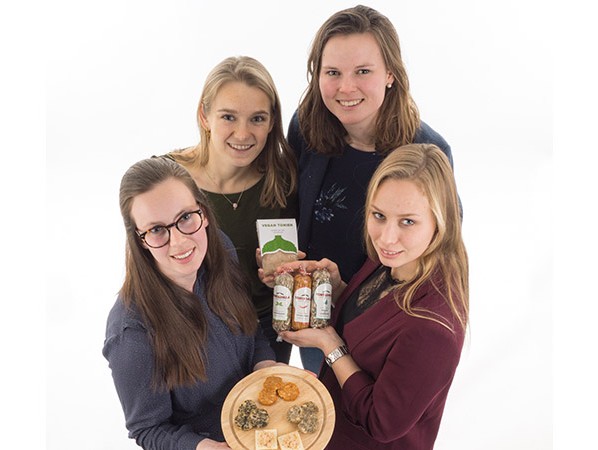
Image: (left to right) Steffi Snijders, Susan Klaver, Aranka Muller en Anna van Vuuren
"The food industry already makes plenty of vegetarian and vegan meat substitutes, but the supply of fish substitutes is relatively small. Moreover, overfishing is a serious problem at the moment. That together formed the reason for us to want to develop a vegan fish substitute, with which we can meet the needs of this target group. The aim was to make an accessible product suitable for drinks and bread. This is how we arrived at a sausage. The main ingredient used in Tontadella is soy. Furthermore, there are ingredients that ensure taste and binding. The sausage comes in three flavours: seaweed capers, spicy peppers and pesto herbs.
Developing a vegan product is not easy, we quickly discovered, because many basic raw materials are excluded. So we naturally opted for a synthetic bowell, otherwise the product is not vegan. In addition, it turned out to be difficult to achieve a real fish flavour and structure in a vegan fish substitute. Yet we succeeded!
The best thing about this project was that we were allowed to develop a completely new concept ourselves and therefore be creative, despite the limitations we faced in terms of raw materials. We've managed to develop a product that is completely 'out of the box', but still meets the needs of the target group.
It was an instructive and challenging project. We are proud of the result we achieved."
Source: © Vakblad Voedingsindustrie 2019